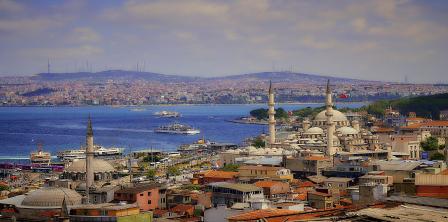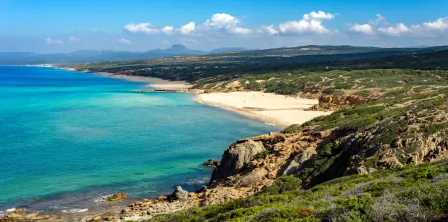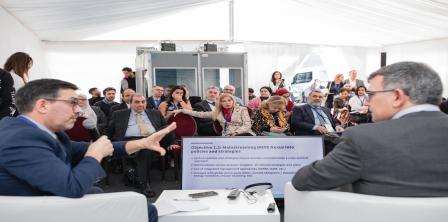Related Child Projects
SCCF Enhancing regional climate change adaptation in the Mediterranean Marine and Coastal Areas.
4.1 Mediterranean Sea Basin Environment and Climate Project
Overview of the Focal Area
Climate change is an urgent and growing threat to human and natural systems. Since the Paris Agreement was adopted in 2015, governments and non-state actors have mobilized to implement it through stronger and more ambitious climate action. However, recent assessments indicate that existing commitments and development pathways are insufficient to meet the long-term temperature goals of the Paris Agreement.
The impacts of climate change are deepening in all corners of the world. Adaptation is one of the approaches to tackling climate change that is becoming increasingly popular and needed. This involves building resilience and preparedness towards the impacts of climate change. Many countries and their governments are realizing that even if all greenhouse gas emissions suddenly stopped overnight, the climate disasters that are happening today i.e., drought, wildfire, flooding will not be going away.
Climate is one of GEF focal areas and GEF was the first global source of funds for climate adaptation. It channels support for climate adaptation mainly through the Least Developed Countries Fund (LDCF) and the Special Climate Change Fund (SCCF) which is one of the Child Projects of the MedProgramme. Considering the commitments made and the global call for higher ambition, the GEF, as an operating entity of the Financial Mechanism, has a mandate to continue to support developing countries to translate their commitments into implementation.
Through SCCF, GEF is helping governments and communities build resilience to climate change through a wide range of strategies, including ecosystem-based adaptation, national adaptation planning, early warning climate forecasting, climate-resilient agriculture, rainwater harvesting, awareness-raising and education, and providing training to communities for new climate-resilient livelihoods.
GEF Funding
The MedProgramme is funded with a $43 million GEF grant. It’s the first time several GEF focal areas join forces (International Waters, Chemical and Waste, Biodiversity and Climate Change Adaptation) to foster the implementation of a Strategic Action Program through a coordinated set of fully-fledged projects for the protection and sustainable use of a major transboundary waterbody such as the Mediterranean Sea Large Marine Ecosystem (LME).
Co-financing
The MedProgramme will introduce a long-term impact and innovative factor, namely the coordination between technical assistance interventions with a large investment portfolio to address the needs defined by the Mediterranean NAPs supported by the European Bank for Reconstruction and Development (EBRD) and the European Investment Bank (EIB). These two International Financial Institutions will provide a cash co-financing of $700 million in the form of loans granted to the beneficiary countries and to public/private actor to foster market creation and transformation, and ensuring sustainability through private sector and municipal involvement.
Child Project Duration
The MedProgramme builds on the successful partnership between UNEP/MAP, the GEF and the 22 Contracting Parties of the Barcelona Convention. It is based on an overarching vision for change that generates a series of 9 interconnected Child Projects: "A healthy Mediterranean with marine and coastal ecosystems that are productive and biologically diverse contributing to sustainable development for the benefit of present and future generations". The MedProgramme will be fully integrated in the UNEP/MAP 2022-2027 Medium Term Strategy (MTS) meant to guide the path for the protection of the Marine Environment and the Coastal Region of the Mediterranean as a clear expression of the commitment and support of the Mediterranean countries to the sustainable development of the Region.
Estimated Aggregated Implementation Progress
The MedProgramme is meant to achieve multiple benefits at the national, regional and global levels, providing at the same time a collective response to regional and global soft and binding international environmental agreements. It aims to kick start the implementation of agreed upon priority actions to reduce the major transboundary environmental stresses affecting the Mediterranean Sea and its coastal areas, while strengthening climate resilience and water security, and improving the health and livelihoods of coastal populations. It does so through a holistic approach addressing:
- Hotspots of land-based sources of pollution.
- Harmful chemicals and wastes (POPs and Mercury) and excess nutrients.
- Critical sections of the coastal zone particularly affected by climatic variability.
- Freshwater stress and habitat degradation.
- The efficient and sustainable management of priority marine protected areas.
- Measuring the progress to impacts.



